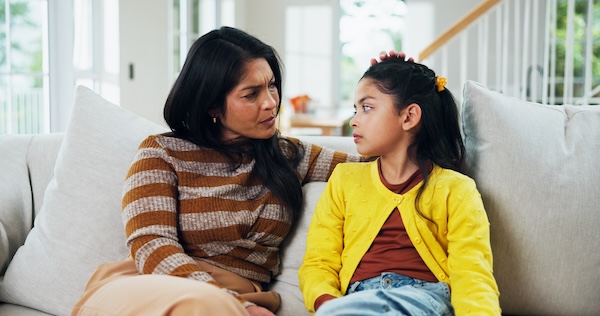Drag
Select
Call Now
How to help your child cultivate a healthy body image (in a social media-obsessed world)
Kid
Parent
Teen

From heavily filtered social media content to digitally enhanced advertisements, we’re all consuming A LOT of skewed images of how people should look. It's no wonder that kids and teens (and adults too) often struggle to accept their bodies and feel confident in their skin. One study reports that up to 50% of teens are “self-conscious” about their bodies.
When kids and teens are flooded with unrealistic standards of beauty, it can fuel debilitating negative thoughts and insecurities. It’s scary to think about, but your reaction, as a parent, doesn’t need to be a total ban. You don’t have to block out all technology to combat negative, and unrealistic beauty standards in the media. From modeling positive self-talk to tapping into fun physical activity, there are small steps you can take right now to help your kiddos feel good in their bodies, and be able to prioritize healthy self-esteem within your home.
What is body image, and where should you start?
Body image is how you think and feel about your appearance. Someone can have a healthy or unhealthy image of their bodies, regardless of how they look. Just like we all need healthy relationships with other people in our lives, it’s equally as important to develop a positive relationship with yourself and the body that you’re in. Our bodies need nurturing, compassion, and understanding.
The first place to start is to adopt a healthier narrative at home. For example, proactively teach your child that people naturally come in many shapes and sizes and that there are no “bad” bodies––all bodies are good bodies. You don’t need to wait for an opportunity to reframe, or respond to an unhealthy image, to talk about why many things we see in the media are unrealistic, and remind them that weight is only one measurement of health.
{{nxtgenchld="/blogcomponents"}}
It’s also important to teach empathy and make it a household rule that treating other people with respect is non-negotiable. This includes avoiding talking about other people’s bodies without their permission. You may need to set firm boundaries with people close to you, like relatives who comment on weight, by gently explaining that research shows that this type of commentary can be really damaging to kids.
How to help children and teens develop a healthy body image
Reaching self-acceptance doesn’t always come easy, especially when it comes to our bodies. Kids and teens are going to have good and bad days, so it can be incredibly helpful to have self-esteem-boosting tools to turn to on those, “Ugh I don’t like myself very much,” kind of days. Here are a few that you can try to help your child feel good about themselves and develop healthy habits for life:
- Help to reframe unhelpful thoughts. We all have intrusive thoughts from time to time. Maybe you’re watching a TV show and think to yourself, “I could never pull off that outfit,” or you see a friend’s beach pictures on social media and immediately say to yourself, “I’ll never look like that.” This is a completely natural reaction, but it doesn’t make these types of thoughts any less painful. Work with your child to notice and normalize these moments so that they can begin to replace unhelpful thoughts with more positive ones. Together, decide on affirmations to use when they look at themselves in the mirror or when feeling insecure. For example, “My body is so healthy and strong” or “I love the way my eyes shine when I smile.” Maybe even grab some sticky notes and have them post encouraging sentiments around their mirror so they see them every day.
- Model it. Kids learn A LOT from watching the adults around them, so let your child or teen hear you practicing self-love. Instead of putting down the way your body looks or talking about wanting to change your appearance, give yourself a compliment like, “This outfit makes me feel super confident!” It may feel awkward at first, but it’s one of the single more powerful actions you can take to improve your child’s self-esteem and body image.
- Make movement more fun. Try introducing your child to different ways of being active by tapping into their interests. They may love rock climbing or might be more interested in gentle yoga or walks in nature. Connect as a family by signing up for a walk-a-thon or taking a hike together. If they’re feeling reluctant or insecure, remind kids and teens that professional athletes come in all shapes and sizes.
- Promote healthy eating. When making meal choices, talk to your child about how the nutrients in foods can help them to be strong and healthy. Instead of focusing on calories, discuss the ways different foods can affect the way we feel and avoid labeling foods as “good” or “bad.” Encourage your child to make intuitive choices about how much and what they eat, while providing nutritious options and not shaming them for wanting to have occasional treats like chips or a cookie.
- Curate content. Talk to your teen about following social media accounts that help them to feel uplifted, to limit content that creates insecurities, and to put limits in place surrounding time spent on apps. If you run across heavily filtered content together, take some time to talk about it and how unrealistic images in the media can affect how we all feel about ourselves.
- Focus on strengths outside of the body. Take time to celebrate your child’s non-physical attributes. Are they funny, hard-working, or artistic? Make it a regular habit to point out their non-physical traits to help build their sense of self.
- Journal it out. For older kids (and maybe you too, parents), try journaling to reflect on thoughts, feelings, and experiences––noting when feelings like sadness, jealousy, insecurity, or happiness are a wonderful habit to build. Writing without judging ourselves can help us start to uncover how all of our thoughts, feelings, and behaviors are connected to each other, as well as what kind of limiting beliefs we might hold so that we can begin to change them.
Here are some prompts to start:
- I feel most confident when…
- I feel most motivated when…
- 3 things that I like most about myself are…
- 3 things that put me in a good mood are…
For younger kids, ask them to draw a self-portrait, and label a few body parts and talk about the reasons they are thankful for them. Maybe they are grateful for their eyes that can see their friends during recess, or their legs that help them run fast during soccer practice, or their mouth that can taste delicious ice cream.
Creating a healthy relationship with your body can be tough work, so give yourself major kudos for wanting to help your child or teen love and accept themselves more fully. Just by being a supportive adult in their corner, you’re taking a huge step in helping them to cultivate a healthy body image. Don’t forget that the team at Bend is here to support your family as you navigate self-esteem, body acceptance, and more.




